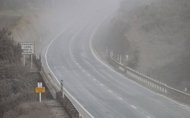Long-dormant New Zealand volcano erupts

The Mount Tongariro volcano, in the middle of North Island, erupted just before midnight (1200 Monday GMT) in the first significant activity at the site since 1897, the official monitoring body GNS Science said.
Witnesses in the area, which was used as a backdrop for the Mount Doom sequences in "The Lord of the Rings" movies, reported "flame-like explosions and a cloud of ash coming from a new hole in the side of the mountain".
"There were rocks being thrown out. It was like thunder and lightning and fireworks. It was spectacular," local resident David Bennett told Fairfax Media.
Police reported no injuries or damage from the eruption.
Civil Defence said it did not result in any lava flows but sent a cloud of ash 20,000 feet (6,100 metres) into the atmosphere, forcing the cancellation of dozens of domestic flights.
While Civil Defence officials did not order any evacuations, they advised residents beneath the cloud to stay indoors with windows and doors sealed.
They said late Tuesday that the immediate threat had passed, but added "an eruption could occur at Tongariro at any time with little or no warning".
Volcanologists admitted the eruption took them by surprise, with no seismic activity recorded at the slumbering volcano before it rumbled back to life.
Prime Minister John Key said authorities were watching the situation closely.
"Civil Defence and others will continue to monitor the situation and if we believe it presents more significant risks then obviously we'll make sure that everyone's well and truly notified of that," he told reporters.
New Zealand lies on the so-called "Pacific Ring of Fire", where the Earth's tectonic plates collide, making it a hotspot for earthquakes and volcanic activity.
One of the country's deadliest disasters occurred in 1953, when debris from an eruption at Mount Ruapehu, also in the central North Island, downed a rail bridge, leading to a train derailment that claimed 151 lives.
Mount Tarawera, in the same area, erupted in 1886, with a death toll estimated at 120-150 people.
Rangipo farmer Dave Allen said the Mount Tongariro eruption woke him with "an almighty bang" and he looked out of his window so see explosions on the side of the mountain, before fleeing his home.
"It was an amazing sight...(but) I didn't hang around to see how beautiful it was going to get in case it all came flying down the mountain on top of us," he told AFP.
"We turned all the power off and grabbed a couple of neighbours and their kids and went off to a meeting point."
Air New Zealand said the eruption affected domestic flights to Gisborne, Rotorua, Taupo, Napier and Palmerston North but most services were back to normal late Tuesday.
The CAA said international flights were not expected to be disrupted, as they cruise above 20,000 feet.
Police said several highways in North Island were initially closed due to poor visibility and reopened Tuesday morning.
GNS Science volcanologist Michael Rosenberg said volcanic activity could continue for weeks.
"This eruption caught us by surprise. We've been monitoring the area after earthquakes, but we didn't expect this," he told TVNZ.
"This might just be a quiet period and we should expect it to start again at any time. So we are watching things very closely."
What the stars mean:
★ Poor ★ ★ Promising ★★★ Good ★★★★ Very good ★★★★★ Exceptional
 Tag:
Tag:
Latest News
More News
- Russian President congratulates Vietnamese Party leader during phone talks (January 25, 2026 | 09:58)
- Worldwide congratulations underscore confidence in Vietnam’s 14th Party Congress (January 23, 2026 | 09:02)
- Political parties, organisations, int’l friends send congratulations to 14th National Party Congress (January 22, 2026 | 09:33)
- 14th National Party Congress: Japanese media highlight Vietnam’s growth targets (January 21, 2026 | 09:46)
- 14th National Party Congress: Driving force for Vietnam to continue renewal, innovation, breakthroughs (January 21, 2026 | 09:42)
- Vietnam remains spiritual support for progressive forces: Colombian party leader (January 21, 2026 | 08:00)
- Int'l media provides large coverage of 14th National Party Congress's first working day (January 20, 2026 | 09:09)
- Vietnamese firms win top honours at ASEAN Digital Awards (January 16, 2026 | 16:45)
- ASEAN Digital Ministers' Meeting opens in Hanoi (January 15, 2026 | 15:33)
- ASEAN economies move up the global chip value chain (December 09, 2025 | 13:32)
















 Mobile Version
Mobile Version